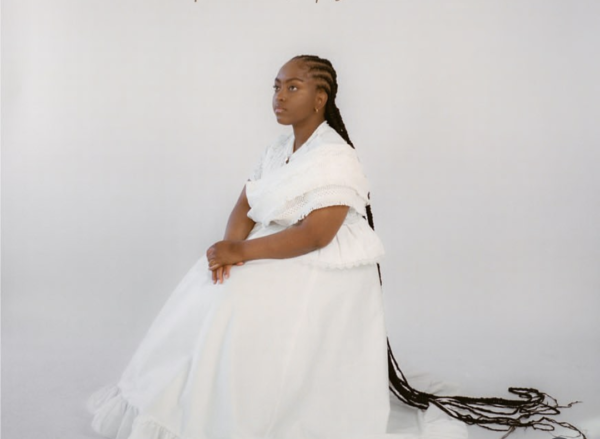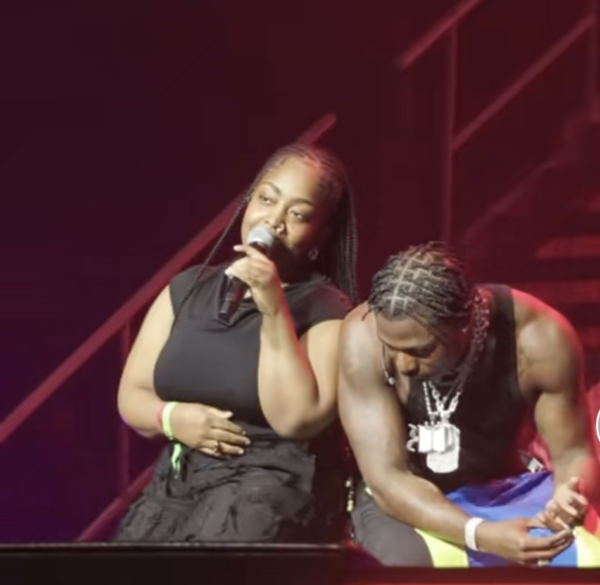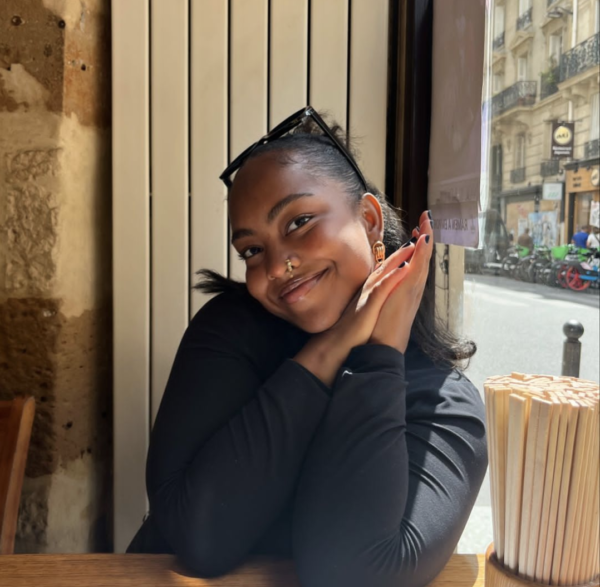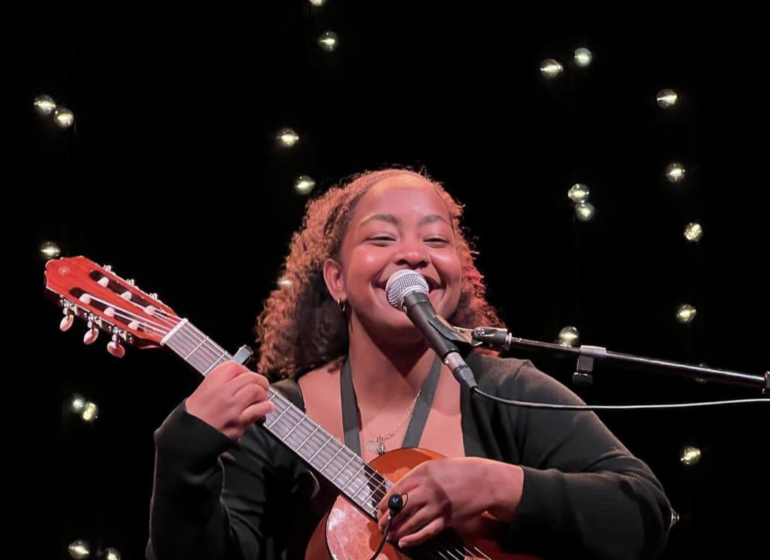Anaïs Cardot, the fast-rising talented French-Gabonese singer, is making waves in the music industry with her distinctive blend of multicultural influences. Her heartfelt lyrics, often focusing on mental health and self-love, resonate deeply with listeners. Born with arthrogryposis, a condition that poses significant physical challenges, the Canada-based artiste has refused to let her disability define her.
In this interview with TheCable Lifestyle’s DEBORAH BODUNDE, Anaïs shared her remarkable story of resilience and determination. She also discussed her musical journey, highlighting notable collaborations with Afrobeats sensation Asake and producer P.priime. She also expressed admiration for singer Asa, citing her as her major inspiration.
Deborah Bodunde: Can you tell us more about your journey into music and how your French-Gabonese heritage has influenced your sound?
Anaïs Cardot: I started making music when I was a kid but when I was 14 was really the moment when I started to really get interested in it. I started making videos on the internet, using SoundCloud while learning more and more. When I was a kid, I grew up between Gabon and France, so I grew up with a lot of French influences from my dad, which I think also really influenced my approach to music. I began playing piano at age twelve, later took a break and got back to it in 2020 when I was 20. The guitar I started in 2018 and I’m still learning.
Deborah Bodunde: Was your dad also a musician?
Anaïs Cardot: Yeah he was a singer and a guitar player, and a lot of other stuff. He is the one who really introduced me to singing as if I had no choice but to sing with my sister and write songs. My dad also had this iPad with like 7,000 songs on it and we would just listen to it always and always. So, I feel like he definitely started it in my head.

Deborah Bodunde: Your music combines elements of jazz, R&B, and indie with Afrobeats. How did you develop this blend, and what artistes or experiences have inspired you the most?
Anaïs Cardot: I grew up listening to jazz and a lot of old soul music and French music of course. But I think I started blending everything because I’m so against being just one thing, so I found a way to blend all the stuff that I’m really interested in. For Afrobeats, that’s recent for me because I’ve only just started being exposed to it. As much as I grew up listening to it, it wasn’t something that I thought I would be into when it comes to singing but then my surroundings really put me into it, all my friends and everybody. But I’m still learning and still trying to get educated when it comes to Afrobeats.
I think we all grew up listening to people like PSquare, Wizkid and the others. Even Davido, I feel like unconsciously I was always around it. I grew up listening to Asa but Asa is not really an Afrobeat artiste, I would say. I grew up around these types of music but I was just absorbing them unconsciously.
Deborah Bodunde: Your debut EP, Pink Magnolia, has resonated with listeners for its intimacy. Could you share the creative process behind this project?
Anaïs Cardot: I started working on it in 2019 and I kept going on during COVID, that was also when I met the main person who worked on it, which is Anoop D’Souza. It was just like a whole moment when I was doing it by myself since it was during COVID. It was a lot about love towards myself and people, but also about how simple life is and how we should celebrate it. I just came to a point where I was just writing about that and whenever I had to put the project out, I realised that I associated these emotions with smell and that was why I called it ‘Pink Magnolia’. It was a really interesting project to work on definitely.
Deborah Bodunde: What was the experience like working with Asake on songs like ‘My Heart’ and ‘Mood’? How did the collaboration come about?
Anaïs Cardot: It was really cool. So he was working with this producer that I know who really liked my work and I think Asake needed someone who could speak Spanish to help him translate a few of the lyrics but also someone who could sing on some hooks, so my friend referred me to him. It was a really beautiful experience, they were really nice about it, I learnt a lot, especially from Asake and the way he approaches music and stuff. It was really an interesting experience and I’m glad I did it.
Asake and Anaïs Cardot performing My Heart is so beautiful to watch. 🥰pic.twitter.com/JjlHqnXxvi
— 𝑺 𝑵 𝑬 𝑯 ➐ (@SnehQueenBee) September 22, 2024
Advertisement
Deborah Bodunde: You recently performed with Asake at his sold-out O2 Arena show. How did it feel to bring your music to such a global stage, and what was the energy like performing live?
Anaïs Cardot: It was really interesting. I feel like I’m still processing how many people there were because I feel like our brains are not wired to see that many people in front of us. So it was really interesting and it was my first time seeing such a big show and also being a part of it. I got to learn again, it was really interesting especially on the accessibility side of things and even the stage presence. I was really impressed by Asake’s performances as well so I guess I learned a lot that day as well. It was really cool.
Deborah Bodunde: Has that experience inspired you to want to perform on stage more often?
Anaïs Cardot: I would not say that because before this I was already performing a lot as well. But I feel like this was just another vision that never really crossed my mind because you can dream but until you see things you cannot really understand. It was a new thing that just crossed my mind and it was inspiring to see how people loved the music and the whole process of things.

Deborah Bodunde: Can you tell us more about ‘Soldier’, which was co-produced by Nigerian producer P.priime? How did that collaboration come about, and what makes this track special for you?
Anaïs Cardot: I had a session with P.priime for another artiste and ten minutes before we ended, he just started playing the guitar and I asked if I could sing on it. I was singing on it and I loved the song right away and then I went back to Paris and just finished working on it. It was definitely really cool to work with P.priime because he’s such a talented person. My friend who is from Nigeria also helped me write the pidgin part, and it is really like a special song to me because I feel like it is a new sound and I got to also learn. The whole thing was a learning process, I guess. It was a really cool experience and I’m obsessed with the song.
Deborah Bodunde: Afrobeats is gaining global popularity, especially with artistes blending international sounds. What role do you believe cross-cultural collaborations play in expanding the genre?
Anaïs Cardot: Collaborations like that expose people more to the genre, people that were probably not educated about it, I would even say people like myself. The more I got to work on Afrobeats with other artistes, the more I got to learn more and even understand how it is a symbol to some people. I think it’s really important because it represents, and it’s good to also showcase all the genres that express our culture.
Deborah Bodunde: You’ve openly shared your journey about a disability. How have overcoming these challenges shaped your approach to music and life in general?
Anaïs Cardot: I think it made me more brave and it allowed me to express myself better because I tend to easily be shy, and so it was a way to just fight it and express it through music. Also I feel like it breaks all the stereotypes that we have about disabilities, I also feel like it’s cool in terms of representation. It’s important to see that even with the disability, you can do this and you can do that and you’re not just meant to stay inside a room. It helped me see beyond a lot of limits.
Deborah Bodunde: Mental health and self-love are key themes in your lyrics. What impact do you hope your songs will have on listeners?
Anaïs Cardot: I really just want people to relate and not feel alone. I feel like music has this power and I find myself many times listening to songs and relating to it and feeling like, ok I’m not crazy. I want people to feel that way about my music as well, and to see that there may be a random person in the world that is going through the same thing as them.

Deborah Bodunde: What would you say has been your biggest accomplishment so far, and what goals are you aiming to achieve in the future?
Anaïs Cardot: I think mine is to find good people to work with. I think it is the best thing I’ve done for myself because without them I would not be able to move and go forward in life. So yeah, I would say that was my best accomplishment. My plan is to be releasing more music and keep growing.
Deborah Bodunde: If you could collaborate with any Nigerian artiste, who would it be and why?
Anaïs Cardot: It would be Asa because I’m really a huge fan of hers. She really changed a lot of stuff in music for me, so it would be Asa. My parents exposed me to her music when I was really young, it’s also cool for me to see a black woman from Africa just making music and thriving. When I was young I only used to see people from the US doing that, so to me, Asa is one of the first women I was really conscious about in music.
Deborah Bodunde: But do you think her style of music and sound have changed over the years?
Anaïs Cardot: Yeah I think so but it’s still good, I would say. But it’s definitely different because she’s working with other people and also sounds evolved. And her music will also evolve but it’s so good.
Deborah Bodunde: Are there any new projects we can look forward to?
Anaïs Cardot: Yeah, new music in the next few weeks and also new music in the next year. Just a lot of music coming, I guess.
Copyright 2025 TheCable. All rights reserved. This material, and other digital content on this website, may not be reproduced, published, broadcast, rewritten or redistributed in whole or in part without prior express written permission from TheCable.
Follow us on twitter @Thecablestyle

